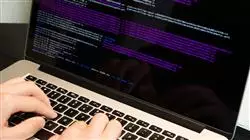University certificate
Scientific endorser

The world's largest faculty of information technology”
Introduction to the Program
Incorporate the main techniques of leadership in technology and information, advancing decisively towards the position of Chief Information Officer”

New technologies have boosted the development of multiple professional areas by introducing innovative models that not only speed up procedures, but also enhance their safety. However, these technologies are constantly evolving, thanks to research that drives the creation of more advanced applications and tools. CIOs play a key role in selecting and managing the right technologies for each business area.
For this reason, this professional figure is becoming increasingly important in the business world. This Advanced master’s degree program addresses essential topics such as the design of programs, applications and operating systems, as well as concepts such as electromagnetism, circuits and computer architecture. TECH goes further by integrating up-to-date knowledge of business administration, offering an integral vision to optimize strategic decision making.
The methodological approach, focused on practice, combines theory with real cases, maximizing the effectiveness of learning. With a 100% online format, the program allows you to study from anywhere and manage your time flexibly. An indispensable opportunity to advance professionally in a high-demand field.
Drive business value with effective management of information systems, a key to organizational success”
This Advanced master’s degree in Information Systems Management (CIO, Chief Information Officer) contains the most complete and up-to-date educational program on the market. The most important features include:
- Practical cases presented by experts in Information Systems
- The graphic, schematic, and practical contents with which they are created, provide scientific and practical information on the disciplines that are essential for professional practice
- Practical exercises where self-assessment can be used to improve learning
- Special emphasis on innovative methodologies in Information Systems Management (CIO, Chief Information Officer)
- Theoretical lessons, questions to the expert, debate forums on controversial topics, and individual reflection assignments
- Content that is accessible from any fixed or portable device with an Internet connection
Access a practical method that combines theory and real cases for an effective and current learning”
It includes in its teaching staff professionals belonging to the Information Systems field, who pour into this program the experience of their work, as well as recognized specialists from reference companies and prestigious universities.
The multimedia content, developed with the latest educational technology, will provide the professional with situated and contextual learning, i.e., a simulated environment that will provide an immersive learning experience designed to prepare for real-life situations.
This program is designed around Problem-Based Learning, whereby the student must try to solve the different professional practice situations that arise throughout the program. For this purpose, the professional will be assisted by an innovative interactive video system created by renowned and experienced experts.
Discover the latest trends in technology applied to information systems with this innovative program"

Take advantage of a 100% online format that allows you to study from anywhere and manage your time flexibly"
Why study at TECH?
TECH is the world’s largest online university. With an impressive catalog of more than 14,000 university programs available in 11 languages, it is positioned as a leader in employability, with a 99% job placement rate. In addition, it relies on an enormous faculty of more than 6,000 professors of the highest international renown.

Study at the world's largest online university and guarantee your professional success. The future starts at TECH”
The world’s best online university according to FORBES
The prestigious Forbes magazine, specialized in business and finance, has highlighted TECH as “the world's best online university” This is what they have recently stated in an article in their digital edition in which they echo the success story of this institution, “thanks to the academic offer it provides, the selection of its teaching staff, and an innovative learning method aimed at educating the professionals of the future”
A revolutionary study method, a cutting-edge faculty and a practical focus: the key to TECH's success.
The most complete study plans on the university scene
TECH offers the most complete study plans on the university scene, with syllabuses that cover fundamental concepts and, at the same time, the main scientific advances in their specific scientific areas. In addition, these programs are continuously being updated to guarantee students the academic vanguard and the most in-demand professional skills. In this way, the university's qualifications provide its graduates with a significant advantage to propel their careers to success.
TECH offers the most comprehensive and intensive study plans on the current university scene.
A world-class teaching staff
TECH's teaching staff is made up of more than 6,000 professors with the highest international recognition. Professors, researchers and top executives of multinational companies, including Isaiah Covington, performance coach of the Boston Celtics; Magda Romanska, principal investigator at Harvard MetaLAB; Ignacio Wistumba, chairman of the department of translational molecular pathology at MD Anderson Cancer Center; and D.W. Pine, creative director of TIME magazine, among others.
Internationally renowned experts, specialized in different branches of Health, Technology, Communication and Business, form part of the TECH faculty.
A unique learning method
TECH is the first university to use Relearning in all its programs. It is the best online learning methodology, accredited with international teaching quality certifications, provided by prestigious educational agencies. In addition, this disruptive educational model is complemented with the “Case Method”, thereby setting up a unique online teaching strategy. Innovative teaching resources are also implemented, including detailed videos, infographics and interactive summaries.
TECH combines Relearning and the Case Method in all its university programs to guarantee excellent theoretical and practical learning, studying whenever and wherever you want.
The world's largest online university
TECH is the world’s largest online university. We are the largest educational institution, with the best and widest online educational catalog, one hundred percent online and covering the vast majority of areas of knowledge. We offer a large selection of our own degrees and accredited online undergraduate and postgraduate degrees. In total, more than 14,000 university degrees, in eleven different languages, make us the largest educational largest in the world.
TECH has the world's most extensive catalog of academic and official programs, available in more than 11 languages.
Google Premier Partner
The American technology giant has awarded TECH the Google Google Premier Partner badge. This award, which is only available to 3% of the world's companies, highlights the efficient, flexible and tailored experience that this university provides to students. The recognition as a Google Premier Partner not only accredits the maximum rigor, performance and investment in TECH's digital infrastructures, but also places this university as one of the world's leading technology companies.
Google has positioned TECH in the top 3% of the world's most important technology companies by awarding it its Google Premier Partner badge.
The official online university of the NBA
TECH is the official online university of the NBA. Thanks to our agreement with the biggest league in basketball, we offer our students exclusive university programs, as well as a wide variety of educational resources focused on the business of the league and other areas of the sports industry. Each program is made up of a uniquely designed syllabus and features exceptional guest hosts: professionals with a distinguished sports background who will offer their expertise on the most relevant topics.
TECH has been selected by the NBA, the world's top basketball league, as its official online university.
The top-rated university by its students
Students have positioned TECH as the world's top-rated university on the main review websites, with a highest rating of 4.9 out of 5, obtained from more than 1,000 reviews. These results consolidate TECH as the benchmark university institution at an international level, reflecting the excellence and positive impact of its educational model.” reflecting the excellence and positive impact of its educational model.”
TECH is the world’s top-rated university by its students.
Leaders in employability
TECH has managed to become the leading university in employability. 99% of its students obtain jobs in the academic field they have studied, within one year of completing any of the university's programs. A similar number achieve immediate career enhancement. All this thanks to a study methodology that bases its effectiveness on the acquisition of practical skills, which are absolutely necessary for professional development.
99% of TECH graduates find a job within a year of completing their studies.
Advanced Master’s Degree in Information Systems Management (CIO, Chief Information Officer)
In the current era, it is undeniable that the use of state-of-the-art technologies and programs favors the execution and optimization of the processes carried out in companies, in addition to allowing the implementation of global and innovative strategies that highlight their participation in the sector. For this reason, more and more companies are choosing to implement IT tools in order to guarantee the security of their data storage and processing. In this context, the Chief Information Officer (CIO) is one of the most relevant roles in the sector, since they are in charge of managing and designing the plan that will allow companies to rely on new technologies to promote their growth. At TECH Global University we have developed the Advanced Master's Degree in Information Systems Management, a program with the most rigorous information to specialize in this field and stand out as one of the reference specialists in the main techniques of leadership in technology and information.
Specialize in Information Systems Management
If your goal as an IT professional is to be part of the digital transformation by providing your technical skills in the use of the latest generation tools to meet the challenges in the business sector, this program is for you. At TECH we offer you the most innovative methodologies, the support of experts in the area and a specialized curriculum that will allow you to outline your technical skills, face the challenges of this discipline and stand out effectively in a highly competitive sector. In the largest School of Computer Science you will reach a new level of knowledge to advance your professional goals.







